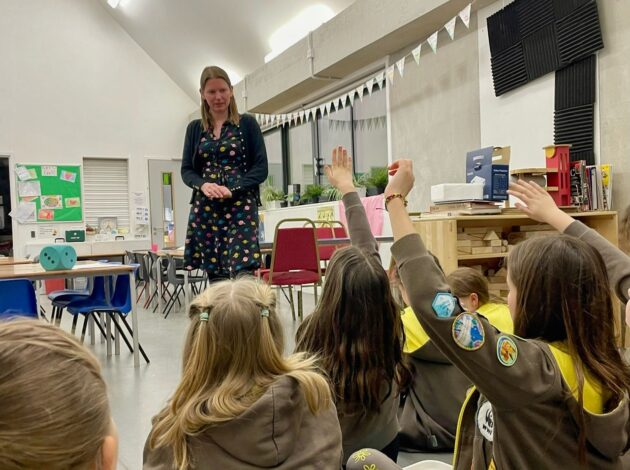Celebrating STEM during British Science Week

With STEM subjects at the core of ONS’s work, Director of Population Statistics, Mary Gregory, explains why we should all be celebrating British Science Week.
British Science Week, running from March 7th to 16th, is a ten-day celebration of science, technology, engineering, and mathematics (STEM). Organised by the British Science Association, the week features engaging events and activities across the UK to inspire people of all ages. It is an amazing opportunity to share the incredible possibilities these subjects offer.
Why STEM Matters to the ONS
At the Office for National Statistics (ONS), we are committed to promoting STEM subjects for two key reasons. Firstly, we publish statistics that shape policies and inform decisions at every level of society. Whether it’s understanding inflation, employment trends, or health data, numbers play an integral role in our daily lives. However, to make the most of this information, people need to understand it.
This is why promoting STEM subjects is essential—not just for those pursuing careers in science or statistics, but for everyone. A strong foundation in data literacy helps individuals critically assess the information they encounter, reducing the risk of misinformation and ensuring they can make informed choices. In an era where social media spreads data at lightning speed, the ability to interpret numbers appropriately is more crucial than ever.
Secondly, we need people with strong numerical and analytical skills at the ONS. Data science, statistics, and technology are at the heart of what we do, and we want to inspire the next generation to see careers in these fields as exciting and fulfilling.
The Role of STEM Ambassadors
British Science Week is going to be a busy one for me. As a STEM ambassador and one of this year’s RSS William Guy lecturers I’ll be going into numerous primary schools and talking to children all week about how much I love science and maths.
I love being a part of the STEM Ambassadors programme – it is a fantastic way to get involved in inspiring young people and has been running for over 20 years.
There’s nothing more rewarding than seeing a child’s face light up when they realise how exciting STEM can be. After a recent talk, a school reached out to tell me their Year 6 students were still buzzing about what we discussed the next day. That’s the kind of impact that can change the course of someone’s future.
And here’s the thing—you don’t have to be a scientist or mathematician to inspire kids. If you work with numbers or data in any way, sharing your journey can show them that STEM careers come in all shapes and sizes.
Breaking the Stereotypes
One of the things I’m most passionate about is changing perceptions of STEM. For too long, there’s been this idea that STEM subjects are just for the “super smart” or that they’re “nerdy.” Thankfully, perceptions are changing, and British Science Week provides a fantastic opportunity to challenge outdated notions. STEM is for everyone. It’s creative, it’s exciting, and it’s full of opportunities to make a real difference in the world.
The enthusiasm I see in young learners during my visits to schools is inspiring. Children are naturally curious about science and maths when you present it in the right way. They may not love memorising times tables, but show them how maths applies to their everyday lives—whether it’s tracking football scores, designing video games, or measuring ingredients for baking—and suddenly, they’re engaged. I truly believe that every child can enjoy maths when they have it explained in a way that clicks for them.
Encouraging Girls
Another big challenge is encouraging more girls to see STEM as a path for them. I was lucky—maths was always my strongest subject, and I had teachers who encouraged me. But I was often one of the only girls in my STEM classes, particularly in subjects like design technology. For some girls, that can be discouraging.
Research shows that girls are more likely to choose STEM subjects in all-girls schools than in mixed schools, which suggests that social factors play a big role. That’s why it’s so important to provide female role models in STEM, showing young women that they belong in these fields just as much as anyone else.
Exciting Initiatives
Beyond school visits, the ONS has partnered with organisations to deliver exciting STEM initiatives over the past year. One standout project was the BBC Micro:bit – The Next Gen campaign.
As part of this initiative, primary school children became ‘playground investigators,’ using pocket-sized computers to collect and analyse data on their school environments. Over 150 schools across the UK participated in this project, gathering insights into how children use their playgrounds and learning essential data skills in the process. By making data collection hands-on and interactive, we helped young learners see its real-world applications in a way that textbooks simply can’t match.
This kind of early exposure is so important because it helps children build confidence in handling numbers and thinking analytically from a young age.
For older students, we developed “Navigating Numbers,” a data education programme designed for further education and sixth-form students. In collaboration with the Association of Colleges (AoC), we created five classroom toolkits exploring topics like gender pay gaps, inflation, and health statistics.
We want to make data literacy accessible to everyone, and by providing free learning materials on our website, we’re helping teachers bring these vital skills into the classroom.
Additionally, promoting STEM outside of schools, a group of ONS volunteers spent ten days back in October at the Manchester Science Festival, engaging with children about the importance of data. Events like this are brilliant because they show children that maths and statistics aren’t just academic subjects—they’re powerful tools that help us understand the world.
Creating Opportunities
At ONS, we’re not just talking about the importance of STEM—we’re actively creating opportunities for young people to build careers in these fields. We offer apprenticeships and T-Levels across a range of disciplines, providing hands-on experience for students looking to work in the world of data.
Last May we even launched a pioneering new degree apprenticeship in Wales. It’s the first of its kind in the UK and gives people the opportunity to develop the skills and experience they need to become a data analyst.
Inspiring the Next Generation
British Science Week is a great time to celebrate STEM, but our commitment to inspiring young people has to go beyond just these ten days. Whether it’s volunteering as a STEM Ambassador, visiting a local school, or simply encouraging a young person to explore science and maths, we all have a role to play.
I’d love to see more people get involved in making STEM exciting, inclusive, and accessible. The future is data-driven, and by working together, we can ensure that the next generation is equipped with the skills and confidence they need to succeed.
Let’s make STEM something that everyone feels excited about.

Mary Gregory – director of population statistics